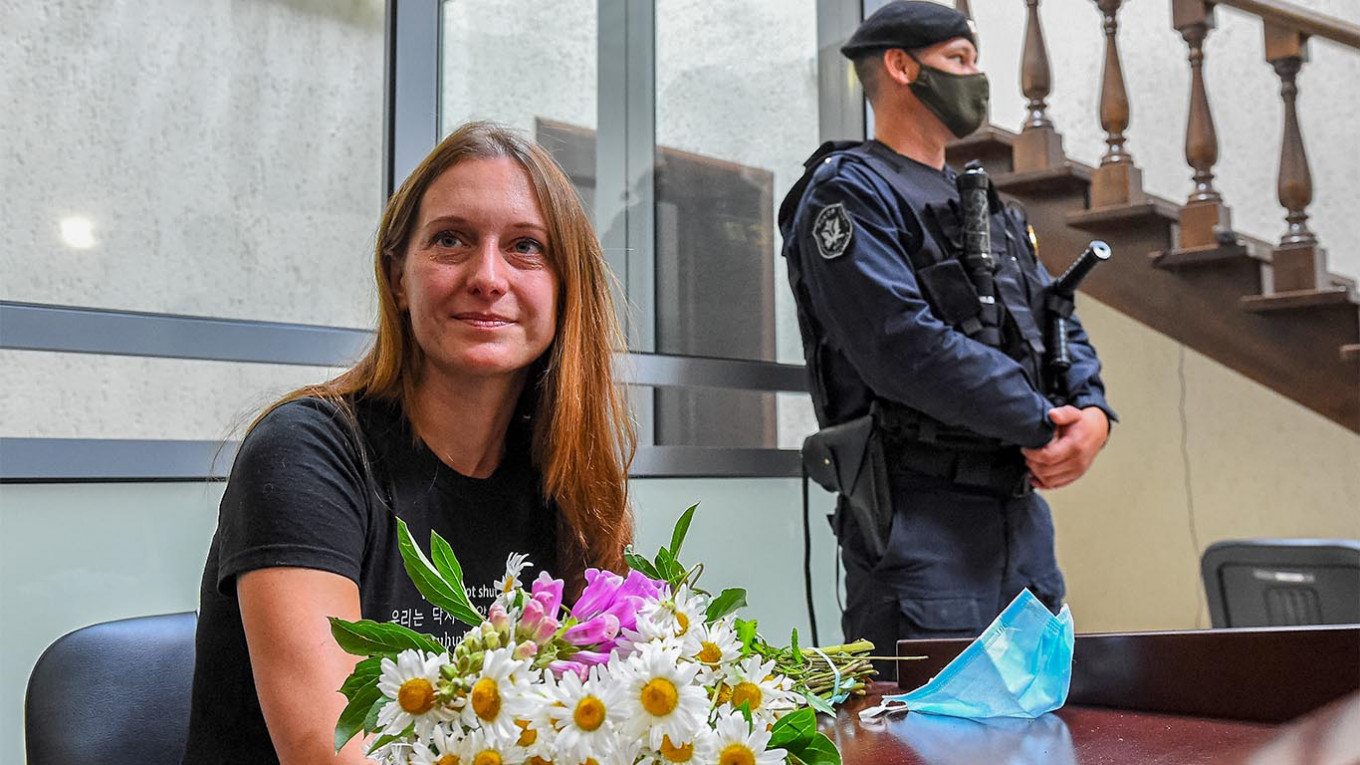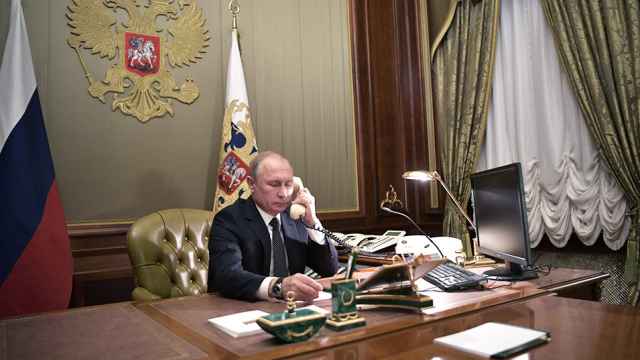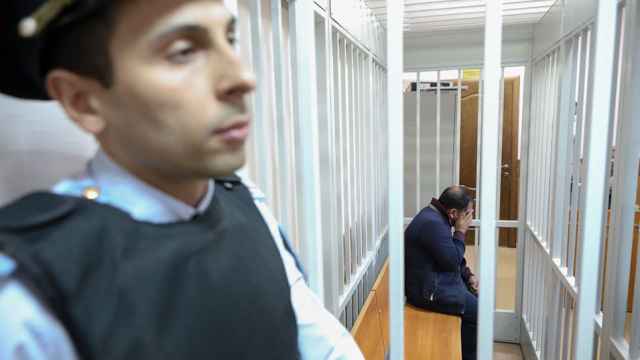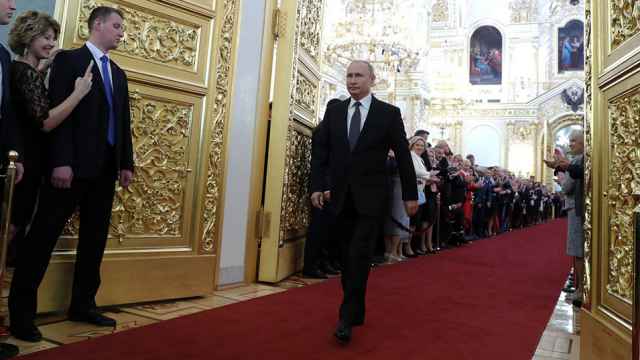On Tuesday, the day after journalist Svetlana Prokopyeva escaped prison time for writing a column, she spent the morning walking around her home city of Pskov in northwestern Russia, enjoying her newfound freedom.
When she returned to her apartment in the early afternoon, the 40-year-old sat down to read and reply to the messages of support filling her inboxes. But as soon as she went on the internet, she was quickly brought back to reality. A fellow journalist had been detained by the Federal Security Service (FSB) for what appeared to be similar reasons. In Prokopyeva’s view, Russia’s security services were sending a message.
“It’s starting to look like a war between the security services and journalists, as if they are in one country and journalists are in another and so they are seen as enemies the security services feel they have to fight with,” Prokopyeva told The Moscow Times by phone Tuesday. “It feels like a real danger.”
Prokopyeva was referring to the case of Ivan Safronov, a former defense reporter who recently started working as an aide to Dmitry Rogozin, the head of Russia’s state space agency Roscosmos. On Tuesday, Safronov was charged with treason. He faces up to 20 years in prison for allegedly passing state secrets to Czech security services during his time as a journalist.
In Prokopyeva’s case, prosecutors had demanded she be sentenced to six years behind bars for allegedly justifying a 17-year-old anarchist’s November 2018 suicide bombing in the lobby of an FSB building in Arkhangelsk in northern Russia. Her crime was linking the attack, which injured three service members, to the political climate under President Vladimir Putin.
Yet despite the harsh request from prosecutors, when her sentencing came Monday, the judge was lenient, ruling only that Prokopyeva pay a 500,000-ruble ($6,985) fine.
Still, as Prokopyeva was quick to point out, she was nonetheless found guilty. That means her name will remain in a government database of extremists.
“It’s a dual feeling,” Prokopyeva said. “On the one hand you escaped the worst. On the other, it’s not a victory.”
The resolution of Prokopyeva’s case was starkly similar to one handed down just over a week earlier to prominent theater director Kirill Serebrennikov, whose productions are often critical of the state.
After prosecutors demanded that Serebrennikov be sentenced to six years in a penal colony, a judge handed down what appeared to be a compassionate ruling. Although Serebrennikov was found guilty of helping to steal 133 million rubles ($1,864,660) from the state, he was given a suspended sentence and an 800,000 ruble ($11,216) fine.
Both cases had been seen by critics as politically motivated, drawing condemnation at home and abroad. That outrage, analysts say, prompted the courts to use an increasingly popular tactic of satisfying the security services that built the cases while also damping down public discontent.
“The logic of the security services is that punishment has to be the maximum, while the job of the presidential administration is to make sure the сhief isn’t agitated,” said Tatiana Stanovaya, founder of the R.Politik political analysis project, referring to Putin and public outcries.
Vitaly Cherkasov, a lawyer with the Agora human rights group and a member of Prokyopyeva’s defense team, echoed the view that the tactic is a compromise between different government factions, describing the ruling as a way for “the wolves to be sated and the sheep to remain intact.”
“The outrage would have been a headache for the authorities,” he said. “But in this way they are still able to send a message about what will — and could — happen if you don’t show loyalty.”
For Andrei Kolesnikov, chair of the Russian Domestic Politics program at the Carnegie Moscow Center, the point of the sentencing is its “instructional” nature.
“The authorities are showing that if you voice political disagreement, you will be judged a criminal and an enemy of the state, even if the public calms down and forgets that ultimately these innocent people are considered guilty,” Kolesnikov said.
But even more than that, Kolesnikov said, the cases are part of a new wave of repressions against opposition-minded Russians that he believes will increase in the wake of this month’s constitutional referendum vote that has given Putin the opportunity to rule until 2036.
“The political atmosphere right now is: those who are not with us are against us,” he said.
Kolesnikov cited the case of Yury Dmitriyev, a 64-year-old gulag historian, who is awaiting sentencing in a case critics believe was drummed up to silence him. On Tuesday, prosecutors asked that he be handed 15 years in a strict-regime penal colony.
“All of this is a demonstration of how the authorities will act in the coming years,” Kolesnikov said.
In what turned out to be a prescient episode of his podcast on Sunday, Mark Galeotti, an expert on Russia’s security services, warned that “there is a sense that hard rains are going to fall.” But he also underscored the role public outcries can play.
He pointed to the 5.5- and 7-year sentences for terrorism handed out last month to two members of the Set anti-fascist activist group that rights groups say were fabricated. What saved Serebrennikov from the same fate, Galeotti said, was his level of public support.
On Tuesday, Ivan Pavlov, a lawyer for journalist Safronov who also defended the last Russian journalist tried for espionage — Grigory Pasko, in 2001 — wrote on Facebook that how journalists react to the arrest will determine not only the “fate of your colleague, but of the journalistic profession in Russia.”
Some journalists wryly complained that with so many cases against journalists they didn’t have time to change their social media avatars to slogans of support, a practice that became popular during the huge public outcry over the arrest of journalist Ivan Golunov on fabricated drug charges last summer.
But many nonetheless joined pickets outside the FSB’s headquarters on Lubyanka Square in Moscow on Tuesday demanding an open trial for Safronov, and 28 people — mostly journalists — were detained.
Yet so far, at least, Safronov’s arrest has not triggered the same level of outrage that ultimately freed Golunov last June.
For her part, Prokopyeva hopes journalists haven’t run out of energy.
“I hope the wave of solidarity that rose up for me will continue for [Safronov] and get him out as well,” she said, adding that she believes their profession is under severe threat.
She noted that she wants the authorities to understand that journalists are not enemies.
“Any journalist is a patriot because they are immersed in the problems of their country,” she said. “The press is the government’s most important tool, because it shares the voice of the people.”
A Message from The Moscow Times:
Dear readers,
We are facing unprecedented challenges. Russia's Prosecutor General's Office has designated The Moscow Times as an "undesirable" organization, criminalizing our work and putting our staff at risk of prosecution. This follows our earlier unjust labeling as a "foreign agent."
These actions are direct attempts to silence independent journalism in Russia. The authorities claim our work "discredits the decisions of the Russian leadership." We see things differently: we strive to provide accurate, unbiased reporting on Russia.
We, the journalists of The Moscow Times, refuse to be silenced. But to continue our work, we need your help.
Your support, no matter how small, makes a world of difference. If you can, please support us monthly starting from just $2. It's quick to set up, and every contribution makes a significant impact.
By supporting The Moscow Times, you're defending open, independent journalism in the face of repression. Thank you for standing with us.
Remind me later.







